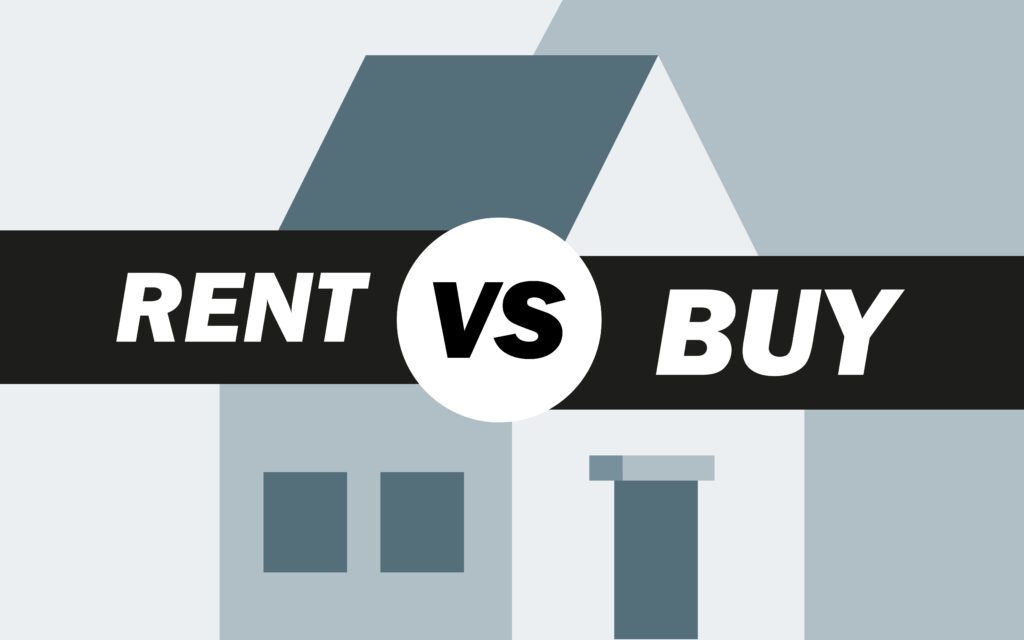Buying vs Renting Property: Which is Better?
Introduction to the Debate: Buying vs Renting Property
For decades, the debate between buying and renting property has been a significant topic of discussion among individuals and families. This decision is not merely a financial one but also carries emotional implications. Choosing to buy a home often symbolizes stability and long-term commitment, while renting can offer flexibility and less financial burden. The importance of this decision lies in its potential to shape one’s financial future and lifestyle.
In different economic climates and housing markets, the advantages and disadvantages of buying versus renting can vary considerably. For instance, in a booming real estate market, purchasing property might seem advantageous due to the potential for property value appreciation. Conversely, in a volatile or declining market, renting might be more appealing due to the lower risk and increased liquidity. Additionally, factors such as interest rates, availability of mortgage options, and regional housing policies can heavily influence this decision.

Financially, the choice between buying and renting involves an analysis of long-term costs and benefits. Homeownership typically requires a substantial initial investment, including a down payment, closing costs, and ongoing maintenance expenses. However, it also offers the potential for building equity and benefiting from tax deductions on mortgage interest. On the other hand, renting usually entails lower initial costs and provides freedom from property maintenance responsibilities, though it does not offer the opportunity to build equity or benefit from home value appreciation.
Emotionally, the decision to buy or rent can affect one’s sense of stability and personal satisfaction. Owning a home can provide a sense of accomplishment and permanence, whereas renting might appeal to those who prioritize flexibility and mobility. The relevance of this topic extends across various demographic groups, from young professionals and families to retirees, each with unique needs and considerations.
Ultimately, the decision to buy or rent property is a multifaceted one, influenced by individual circumstances, economic conditions, and personal preferences. This ongoing debate continues to be pertinent as housing markets and economic climates evolve, making it a critical topic for anyone considering their housing options.
Financial Considerations: Upfront Costs and Long-term Investment
When evaluating the financial implications of buying versus renting property, several key factors come into play. For those considering purchasing a home, the initial financial commitment is substantial. Buyers are typically required to make a down payment, which can range from 5% to 20% of the property’s value. This is followed by monthly mortgage payments that include both principal and interest, often extending over 15 to 30 years. In addition to mortgage payments, homeowners must also account for property taxes, which vary based on the location and assessed value of the property. Maintenance costs are another significant consideration, as ongoing repairs and upkeep can add up over time.
On the other hand, renting a property involves different financial dynamics. Renters are usually required to pay a security deposit, often equivalent to one or two months’ rent, which is refundable upon lease termination, provided the property is in good condition. Monthly rent payments are the primary ongoing expense, and these can fluctuate based on market conditions and lease agreements. Unlike homeowners, renters are not responsible for property taxes or maintenance costs, although they might face periodic rent increases, which can impact long-term financial planning.

When comparing the long-term financial implications of buying versus renting, one must consider the potential for building equity. Homeownership allows individuals to accumulate equity over time as they pay down their mortgage and as property values appreciate. This equity can be leveraged for future financial needs or can result in substantial profits upon selling the property. Conversely, renting does not offer the benefit of equity accumulation; rent payments are essentially expenses that do not contribute to personal wealth. However, renting does provide flexibility and can be less financially burdensome in the short term, as it eliminates the need for a large upfront investment and ongoing maintenance responsibilities.
Ultimately, the decision between buying and renting hinges on individual financial goals, stability, and lifestyle preferences. Each option presents its own set of financial advantages and challenges, making it essential to carefully evaluate both the immediate and future economic impacts.
Lifestyle and Flexibility: Which Option Suits Your Life Stage?
When deciding between buying and renting property, one must consider how each option aligns with their current lifestyle and personal circumstances. Renting often provides a higher degree of flexibility, making it an appealing choice for those who anticipate frequent changes in their life or career. For instance, renting allows individuals to easily relocate for job opportunities, pursue educational endeavors, or accommodate personal reasons without the long-term commitment attached to property ownership. This flexibility can be particularly advantageous for young professionals, students, and those who value the freedom to move without the burden of selling a property.
On the other hand, owning a home offers a different set of advantages that may align well with individuals in a more stable or predictable phase of their life. Homeownership often provides a sense of stability and permanence, making it ideal for those looking to settle down, start a family, or establish roots in a community. However, this stability comes with certain limitations. Homeowners may find it more challenging to relocate due to the time and financial investment required to sell a property. Additionally, career changes that necessitate moving to a new location can be more complex and costly for homeowners compared to renters.

Moreover, owning a home may involve additional responsibilities such as maintenance, repairs, and property taxes, which can be demanding on both time and finances. Conversely, renters often benefit from landlords handling these concerns, allowing them to focus on other aspects of their lives. This can be particularly beneficial for those with busy schedules or limited financial resources for unexpected home-related expenses.
Ultimately, the decision between buying and renting property hinges on an individual’s life stage, career goals, and personal preferences. While renting offers unmatched flexibility, buying a home can provide stability and a sense of long-term investment. Each option has its own set of benefits and challenges, and individuals must carefully assess their unique circumstances to make an informed choice that best suits their lifestyle.
Market Conditions and Timing: When to Buy or Rent?
Market conditions and timing play crucial roles in the decision-making process of whether to buy or rent property. Understanding these factors can significantly impact financial outcomes and long-term stability. One of the primary elements to consider is interest rates. When interest rates are low, borrowing costs decrease, making homeownership more financially attractive. Conversely, high interest rates can increase monthly mortgage payments, potentially making renting a more viable option.
Housing market trends also hold substantial weight in this decision. In a seller’s market, where demand outstrips supply, property prices tend to rise, which can make buying less appealing. On the other hand, a buyer’s market, characterized by an abundance of available properties and lower prices, can present opportunities for advantageous purchases. Monitoring these trends helps prospective buyers and renters make informed decisions.

Economic stability is another significant factor. In times of economic uncertainty or recession, renting may offer more flexibility and lower financial risk compared to buying. Owning a home typically requires a long-term commitment and involves additional costs such as maintenance, property taxes, and insurance. In a stable or growing economy, buying property can be a sound investment, potentially leading to property value appreciation over time.
To assess whether the current market favors buying or renting, consider analyzing housing affordability indexes, which compare median home prices to median household incomes. Additionally, rental yield, the annual rental income as a percentage of the property value, can provide insights into the relative benefits of renting versus buying. Tools such as mortgage calculators and rent vs. buy calculators can also aid in making these comparisons.
Predicting future market movements requires keeping abreast of economic indicators, such as employment rates, GDP growth, and inflation. Real estate market forecasts, provided by industry experts, can offer valuable predictions on future trends. By staying informed, individuals can better time their decisions to align with favorable market conditions, whether opting to buy or rent.
Maintenance and Responsibilities: Ownership vs. Tenant Obligations
When considering the decision between buying and renting property, the aspect of maintenance and responsibilities plays a significant role. Homeownership inherently comes with a range of responsibilities that renters typically do not face. Property upkeep, repairs, and renovations fall squarely on the shoulders of the homeowner. This includes routine tasks such as lawn care, cleaning gutters, and ensuring that the HVAC system is functioning properly. Additionally, any damage or wear and tear over time, such as a leaky roof or faulty plumbing, necessitates either a DIY approach or hiring professionals, both of which require time and financial investment.
For homeowners, the ability to make renovations is both an opportunity and a responsibility. While it allows for personalizing the living space to one’s preferences, it also means bearing the full cost and effort of such projects. Renovations, whether minor cosmetic changes or significant structural modifications, demand not only an initial investment but also ongoing maintenance to preserve the value and integrity of the property.
On the other hand, renters generally experience fewer maintenance responsibilities. Most rental agreements stipulate that landlords are responsible for major repairs and maintenance issues. This includes addressing problems such as broken appliances, plumbing issues, or structural repairs. Renters are usually expected to maintain the cleanliness and minor upkeep of the rental unit but are not financially liable for significant repairs. This can significantly reduce the stress and time commitment associated with property maintenance.
However, renters must adhere to the constraints set forth by their lease agreements, which often limit the extent to which they can modify or personalize their living space. Any unauthorized changes could lead to penalties or loss of security deposits. Therefore, while renting may offer convenience and fewer responsibilities, it comes with limitations on the living environment’s customization.
Ultimately, the choice between buying and renting property requires careful consideration of the maintenance responsibilities involved. Homeownership demands a proactive approach to property care and a readiness to invest time and money into its upkeep. Renting, while offering a lower level of responsibility, comes with its own set of constraints. Each option presents a unique set of challenges and benefits that must be weighed according to individual circumstances and preferences.
Tax Implications and Financial Incentives
When evaluating the cost-effectiveness of buying versus renting property, understanding the tax implications and financial incentives is crucial. Homeowners often benefit from several tax advantages that can significantly offset the costs associated with purchasing and maintaining a property. One of the primary benefits is the mortgage interest deduction, which allows homeowners to deduct the interest paid on their mortgage from their taxable income. This deduction can result in substantial savings, especially in the early years of a mortgage when interest payments are higher.
In addition to the mortgage interest deduction, homeowners may also benefit from property tax deductions. These deductions enable homeowners to deduct the amount they pay in property taxes from their taxable income, further reducing their overall tax liability. Furthermore, certain home improvements that enhance energy efficiency may qualify for tax credits, providing additional financial incentives to invest in property ownership.
For renters, the tax benefits and financial incentives are generally less direct. While renters do not receive deductions for rent payments, they may qualify for state-specific renter’s credits or housing assistance programs. However, these benefits usually do not match the scope of the tax incentives available to homeowners. This disparity can make renting appear less financially advantageous in terms of tax savings.
The overall cost-effectiveness of buying versus renting also depends on individual financial situations and market conditions. While homeowners can leverage tax deductions to reduce their costs, they must also consider property maintenance, insurance, and potential fluctuations in property value. Renters, on the other hand, benefit from lower upfront costs and greater flexibility but miss out on the opportunity to build equity and capitalize on property appreciation.
Ultimately, the decision to buy or rent hinges on a careful analysis of these financial factors. Prospective buyers should weigh the long-term tax benefits and potential for property appreciation against the responsibilities and costs of ownership. Renters should consider their lifestyle preferences and financial stability when evaluating the overall cost-effectiveness of renting. By thoroughly understanding the tax implications and financial incentives, individuals can make informed decisions that align with their financial goals and personal circumstances.
Emotional and Psychological Factors
When deliberating between buying and renting property, emotional and psychological factors play a significant role in the decision-making process. Purchasing a home often brings about a profound sense of ownership and stability. Homeowners tend to feel a deeper connection to their property, fostering a sense of pride and accomplishment. This emotional attachment can contribute to a greater sense of security and belonging, which can enhance overall well-being and happiness.
Conversely, renting offers a different set of emotional and psychological benefits. The flexibility and lack of long-term commitment associated with renting can provide a sense of freedom and mobility. Renters have the liberty to relocate when opportunities arise, without the burdens of selling a property. This lifestyle can be particularly appealing to individuals who value the ability to adapt to changing circumstances, such as career advancements or personal growth.
Moreover, renting can alleviate the stress and responsibilities that come with homeownership. Maintenance, repairs, and property taxes are typically managed by the landlord, allowing renters to focus on other aspects of their lives. This can lead to reduced anxiety and an improved quality of life, as renters are not financially tied to the long-term upkeep of a property.
On the other hand, the transient nature of renting may lead to a lack of stability and a sense of impermanence. Frequent moves and the inability to make significant changes to a rental property can create feelings of instability and disconnection. Over time, this can impact mental health and overall contentment.
Ultimately, the emotional and psychological impacts of buying versus renting property are deeply personal and can vary widely based on individual preferences and life circumstances. Both options offer unique advantages and potential drawbacks, making it essential to consider how each aligns with one’s long-term goals and values.
Making the Decision: Key Takeaways and Personal Considerations
When deliberating between buying and renting property, it is crucial to weigh the advantages and disadvantages of each option. Buying a property offers the potential for building equity over time, stability, and the freedom to modify the home to fit personal tastes. However, it also comes with substantial upfront costs such as down payments, closing fees, and ongoing responsibilities like maintenance and property taxes.
On the other hand, renting provides flexibility, which can be particularly beneficial for individuals who anticipate relocating frequently or those who are not ready for the financial commitment of homeownership. Renters are generally not responsible for maintenance costs, allowing them to allocate funds elsewhere. Nonetheless, renting does not contribute to long-term equity and may come with restrictions set by landlords.
To make an informed decision, individuals should first assess their financial readiness. This includes evaluating savings for potential down payments, current debt, and credit score, as these factors significantly impact mortgage eligibility and interest rates. Additionally, calculating the total cost of homeownership versus renting over a period can provide clearer financial insight.
Lifestyle preferences also play a pivotal role. Prospective homeowners should consider their long-term plans, such as career stability, family growth, and the desire for a permanent residence. Conversely, those who value mobility or foresee changes in their living situation may find renting more suitable.
Furthermore, long-term goals should be factored into the decision-making process. For individuals aiming to build wealth through property investment, buying a home may align better with their objectives. However, if immediate financial flexibility and lower monthly obligations are prioritized, renting could be the preferable choice.
Ultimately, the decision between buying and renting hinges on a comprehensive evaluation of one’s financial health, lifestyle needs, and long-term aspirations. By considering these elements, individuals can make a well-rounded choice that aligns with their unique circumstances and goals.


Leave a Reply